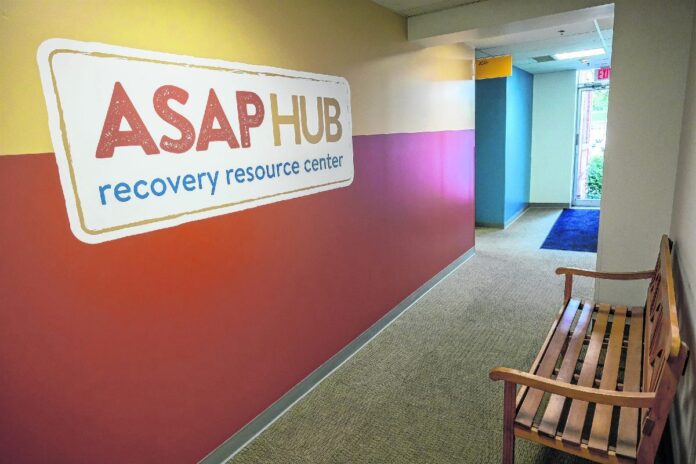
The Alliance for Substance Abuse Progress in Columbus hopes to open the first of a series of sober living transitional homes by mid-June.
The idea of the homes is to allow those who have completed a substance abuse program to have build a support network, and to establish job and financial stability amid a structured environment while in the initial stages of recovery — all to better ensure long-term success of remaining free of substance abuse.
Length of a stay varies greatly, according to agencies such as the National Institute on Drug Abuse. Some national medical or psychology journals have reported the average stay to be between five months to a year.
The local implementation of the sober living home concept has been three years on the making, said Doug Leonard, ASAP executive director. He acknowledged that such an element of recovery assistance is badly needed.
[sc:text-divider text-divider-title=”Story continues below gallery” ]
“Its absence is nearing a crisis,” Leonard said.
Those staying in a facility will be under the supervision of a house manager — “someone in recovery who truly understands what that’s about” — making certain that residents are regularly drug-tested, holding a job, handling assigned duties within the home, attending recovery support meetings and such, Leonard said. Residents also will have to pay a monthly fee that could be in the range of $500 or more, according to Leonard.
Those payments will help cover the costs of a home’s upkeep and operation.
“We’re hoping that will make it at least a break-even proposition,” Leonard said. “But we’re also seeking some philanthropic support.”
Leonard said ASAP has had conversations about those financial possibilities with entities ranging from foundations “to one major church. And we do hope some ministries and other churches will be interested in sponsoring maybe one of these homes — or offering some parts of financial underwriting.”
The home will be furnished with donated furniture, except for new mattresses, bedding, and kitchen appliances. In fact, donated furniture is the one area in which the public currently can help the most, according to Leonard.
ASAP will be renting this first home in downtown Columbus from a local landlord. He added that plans are in place for COVID-19 testing of residents and monitoring after the home’s opening. Other agencies operating such homes in other states currently are doing so safely with proper distancing among residents, Leonard said.
Local nonprofit Thrive Alliance will serve as the owner of future sober living homes. For the sake of security and supervision, the homes’ locations will be kept private, Leonard said.
The nonprofit Lincoln-Central Neighborhood Family Center, already a key player locally in job training, including for people at a starting-over point in life, will assist residents in this first home with a variety of programs, Leonard said. Bartholomew County Works is just one of those programs.
Mark Lindenlaub, Thrive Alliance’s executive director, said he is excited to see the project moving forward.
“We’re thrilled to be part of the team working on this,” Lindenlaub said. “We as an agency have been focused on affordable housing solutions for 30 years. We know that people regularly have a lot of conditions driving their need for affordable housing.
“And we know that this specific population often faces significant challenges to finding affordable housing in the open market. So we see this work as a perfect fit with our mission.”
The local agencies are working alongside Ascension Recovery Services based in Morgantown, West Virginia, on the effort. Ascension operates six sober living homes there. Jon Dower, Ascension’s director of recovery services, said such recovery efforts are effective partly “because the whole community becomes part of the solution.”
He said that can range from businesses putting hone residents to work to nonprofits assisting them in various ways.
Dower said without substance abuse clients getting transitional help such as these homes, “it’s almost like asking for a relapse,” as he put it. “Sometimes that can be because of a circle of unhealthy friends, with substance abuse still occurring in the person’s immediate environment, because they just don’t have a healthy place to return to.”
Leonard said that ASAP sober living homes will utilize best practices in recovery housing based on National Alliance for Recovery Residences standards. And the ASAP will seek certification with Indiana Affiliation of Recovery Residences for its homes. In fact, ASAP leaders discussed with the Rx Abuse Leadership Initiative about a grant that would help ASAP develop a tool kit that could serve as a step-by-step guide for anyone wishing to establish such a sober living home.
“We’re trying to think of this (first) house as a model that others in the community could replicate,” Leonard said.
He mentioned that ASAP has been in regular communication with others such as leaders with Faith Hope and Love Church of God In Christ, hoping to establish a recovery home for women in the near future.
[sc:pullout-title pullout-title=”How you can help” ][sc:pullout-text-begin]
The Alliance for Substance Abuse can use the public’s help on its first sober living home aimed for a mid-June opening.
The agency is seeking donated furniture for the structure to house eight men.
Ideally, organizers hope they can organize pick up of donated pieces, or have them dropped off at the home or another location.
Information: 812-418-8705 or asapbc.org
[sc:pullout-text-end]




